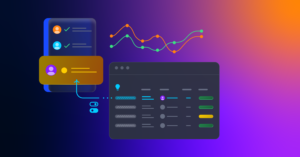
The Internet of Things (IoT) is the new buzzword today. It refers to everyday objects that contain embedded technology to communicate and sense or interact with their internal states or the external environment.
IoT is term as the next generation of telecommunication in which physical things or devices are given identities, connectivity, and the ability to send and receive data over the internet. The different features are integrated into common devices like home appliances, automotive sensors, security systems, and much more. Moreover, the Internet of Things transforms our lives by simplifying routines and providing us more control over our daily affairs.
The potential of IoT is immense. But, most organizations fail to grasp the importance of how it could affect web development. In this article, we look at how the Internet of Things impacts web development and future strategies.
How does IoT impact web Development?
IoT Creates a Robust Backend
The Internet of Things creates a robust backend with real-time information that allows developers to put new levels of automation in place. Moreover, IoT helps to understand consumer behavior and preferences more quickly. It also has a great utility to gather data from thousands of devices.
The low cost of sensors and embedded devices, coupled with their durability and ease of deployment, makes IoT a compelling option for businesses looking to develop applications that save time and money by analyzing data in real-time.
IoT Provides Chatbot Integration
Chatbots are another great way that IoT is being integrated into web development. IoT as an interface for chatbot integration that helps reduces human intervention with ongoing processes. The technology allows for intelligent responses and self-improvement, which leads to a better customer experience. Developers can use a combination of these tools, such as IBM Watson and Klabot, to create high-quality bots designed specifically for web applications.
The IoT based chatbots have the ability to interact directly with end-users while drawing data from all other connected devices in order to gather more information on how they should respond.
Furthermore, AI systems such as chatbots – can use by IoT developers to provide deeper levels of integration than traditional human beings can offer. For instance, rather than get up from behind their desks and come over to your business when you need something changed or fixed, they could simply change it through your website instead.
IoT Promotes Dynamic User Interfaces (UI)
We’re in an age where user experience (UX) design is more important than ever before. In a day and age when people use their smartphones as a remote control for their entire lives, design matters. UI design will likely be more dynamic in an IoT world.
It promotes dynamic, user-interactive interfaces. Many IoT devices are equipped with sensors that enable information to be processed as data, which can relay, over network protocols. Consequently, With IoT, there’s a huge amount of data that can be retrieved and analyzed. This data can easily be incorporated into dynamic user interfaces (UI) to provide you with vital information at any given moment.
The more data available via your UI, the more useful your product will become for end users. In turn, more useful products tend to lead to higher levels of customer satisfaction and brand loyalty over time. Dynamic UI creation expands developers’ ability to offer their end users a variety of interactive experiences.
IoT Improves Web Speed
It is important to remember that it’s not necessary for every web application to be mobile-first. Many websites are used at home and on desktop computers, which is why sites still need to function smoothly with a normal internet connection. An IoT could improve speed for customers who have applications in situations where broadband internet is often slow or unreliable.
For example, an IoT network could automatically decrease image sizes and compress videos to fit within a limited bandwidth allotment or delay their loading until broadband connectivity was available.
IoT Offers Live Insight and Responses
IoT websites provide real-time information and quick response time. The goal for businesses will create a relationship with their customer, ensure that their product is up to date and functioning correctly, help them understand their usage habits for energy consumption,
This means users can streamline processes, make data-driven decisions, and create better experiences for their customers. It allows a better understanding of the customer with the motive to meet the expectations.
With smart devices interconnection, websites can interact in a new way. Hence, the IoT offers live insight and responses through which users can make decisions based on how different products work in real-time.
Conclusion
The Internet of Things is a field that’s growing at a fast pace, and it’s bound to impact web development. If you are planning to hire web developers, then they must be ready for new programming languages and frameworks specific to developing applications for connected devices. Furthermore, the growing need for internet-connected devices will change how businesses engage with their customers.




